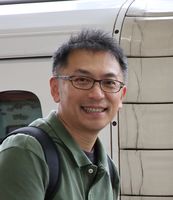Keng, C.: Difference between revisions
Keng, C.
No edit summary |
No edit summary |
||
| (2 intermediate revisions by the same user not shown) | |||
| Line 5: | Line 5: | ||
|pagename=Keng, C. | |pagename=Keng, C. | ||
|PersonType=Authors of English Works; Professors | |PersonType=Authors of English Works; Professors | ||
|images=File:Keng Ching Center for Buddhist Philosophy.jpg | |||
|MainNamePhon=Ching Keng | |MainNamePhon=Ching Keng | ||
|MainNameChi=耿晴 | |MainNameChi=耿晴 | ||
|bio=Ching Keng 耿晴 is Assistant Professor at the Department of Philosophy, National Chengchi University, Taipei, Taiwan. His field of research is Yogâcāra and Tathāgatagarbha thought in India and China during the medieval period. He has been part of various research projects studying Dharmapāla’s ''Commentary on the Viṃśikā of Vasubandhu'' and Dharmapāla’s ''Commentary on the Ālambanaparīkṣā of Dignāga'', Wŏnch’uk’s ''Commentary on the Saṃdhinirmocana-sūtra'', and the development of the Three-Nature theory (''trisvabhāva-nirdeśa'') in Yogâcāra. Among his publications are: his PhD dissertation, entitled “Yogâcāra Buddhism Transmitted or Transformed? Paramârtha (499-569 CE) and His Chinese Disciples” (2009); and journal articles such as "A Fundamental Difficulty Embedded in the Soteriology of Tathāgatagarbha Thought? – An Investigation Focusing on the ''Ratnagotravibhāga'' (2013), and "The Dharma-body as the Disclosure of Thusness: On the Characterization of the Dharma-body in the ''Nengduan jin’gang banruo boluomi jing shi''." (2014) (both written in Chinese). (Source: [Books/A_Distant_Mirror ''A Distant Mirror''], 530–31) | |email=ckeng@nccu.edu.tw | ||
|bio=Ching Keng 耿晴 is Assistant Professor at the Department of Philosophy, National Chengchi University, Taipei, Taiwan. His field of research is Yogâcāra and Tathāgatagarbha thought in India and China during the medieval period. He has been part of various research projects studying Dharmapāla’s ''Commentary on the Viṃśikā of Vasubandhu'' and Dharmapāla’s ''Commentary on the Ālambanaparīkṣā of Dignāga'', Wŏnch’uk’s ''Commentary on the Saṃdhinirmocana-sūtra'', and the development of the Three-Nature theory (''trisvabhāva-nirdeśa'') in Yogâcāra. Among his publications are: his PhD dissertation, entitled “Yogâcāra Buddhism Transmitted or Transformed? Paramârtha (499-569 CE) and His Chinese Disciples” (2009); and journal articles such as "A Fundamental Difficulty Embedded in the Soteriology of Tathāgatagarbha Thought? – An Investigation Focusing on the ''Ratnagotravibhāga'' (2013), and "The Dharma-body as the Disclosure of Thusness: On the Characterization of the Dharma-body in the ''Nengduan jin’gang banruo boluomi jing shi''." (2014) (both written in Chinese). (Source: [https://buddhanature.tsadra.org/index.php/Books/A_Distant_Mirror ''A Distant Mirror''], 530–31) | |||
|affiliation=National Chengchi University 國立政治大學 | |||
|IsInGyatsa=No | |IsInGyatsa=No | ||
}} | }} | ||
Latest revision as of 16:21, 6 May 2020
| PersonType | Category:Authors of English Works Category:Professors |
|---|---|
| MainNamePhon | Ching Keng |
| MainNameChi | 耿晴 |
| bio | Ching Keng 耿晴 is Assistant Professor at the Department of Philosophy, National Chengchi University, Taipei, Taiwan. His field of research is Yogâcāra and Tathāgatagarbha thought in India and China during the medieval period. He has been part of various research projects studying Dharmapāla’s Commentary on the Viṃśikā of Vasubandhu and Dharmapāla’s Commentary on the Ālambanaparīkṣā of Dignāga, Wŏnch’uk’s Commentary on the Saṃdhinirmocana-sūtra, and the development of the Three-Nature theory (trisvabhāva-nirdeśa) in Yogâcāra. Among his publications are: his PhD dissertation, entitled “Yogâcāra Buddhism Transmitted or Transformed? Paramârtha (499-569 CE) and His Chinese Disciples” (2009); and journal articles such as "A Fundamental Difficulty Embedded in the Soteriology of Tathāgatagarbha Thought? – An Investigation Focusing on the Ratnagotravibhāga (2013), and "The Dharma-body as the Disclosure of Thusness: On the Characterization of the Dharma-body in the Nengduan jin’gang banruo boluomi jing shi." (2014) (both written in Chinese). (Source: A Distant Mirror, 530–31) |
| affiliation | National Chengchi University 國立政治大學 |
| IsInGyatsa | No |
| Other wikis |
